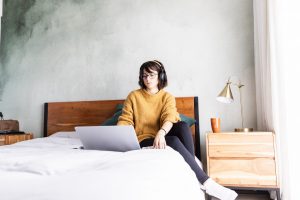Life since the onset of the COVID-19 pandemic in March of 2020 has significantly shifted our day-to-day activities. It’s also impacted the ways we relate to ourselves and each other. With this drastic shift and so many factors outside of our control, it may feel hard to regain a sense of balance.
Understandably a fear of the unknown regarding one’s own health and safety can cause increased anxiety. It can also trigger unhealthy ways of coping. Since the pandemic began, our worlds have become smaller.
Our travel and even our daily movement were significantly decreased. This also meant that our social lives became very limited or moved entirely to a virtual space. This led to spending more time alone and more time on the internet.
A combination of an increase in fear and anxiety, an increase in the use of social media, and severe isolation have had a profound impact on people. Especially those with disordered eating and body image-related distress.
Over the course of the pandemic, the National Eating Disorder Association helpline has reported a huge 40% increase in call volume (Forbes). It is apparent the challenges that lend to this increase and are explained more below.
Isolation
Eating is commonly a very social activity that bonds people and brings them together over shared flavors and tastes.
Disordered eating is an activity that is done typically in secret or without people knowing about it. During the pandemic, people were unable to be around others due to fear of spreading the disease.
They were forced to stay in their homes and remain distant from their loved ones. People who already have a history of disordered eating and who were plunged into the loneliness that came with pandemic separation might have had ED behaviors exacerbated during this time.
Without a support group or people to check in with, folks who struggled with food were left on their own. Even now that the pandemic isolation has decreased, eating habits and patterns established during that time can be hard to break.
Social Media Use
With in-person activities put on pause, many turned to social media for their social outlet. Social media can be a useful tool to connect with loved ones and others with similar interests, but can also be dangerous for people who struggle with their body image.
According to Rodgers et al., eating disorder levels might worsen through exposure to unrealistic body images, negative stories, and stressful news. Photographs on social media show people at their best and do not always show the full picture of their experience. Photos can also be edited to make someone look more appealing.
During this time of extreme isolation, people who have struggled with body image issues are without the ability to discern between people’s “best” version of themselves and the reality that no one is perfect.
When they are flooded with images of thinness or certain body types, it can be hard to feel happy, safe, and comfortable with their own bodies.
Increased Anxiety & Fear
The fear and anxiety that were felt during the onset of the pandemic were deep and real. The long-term effects tend to show up in behaviors that are not healthy as a coping mechanism.
For people with struggles with their eating and relationship to food, the behaviors related to food (restrictive, bingeing, or purging) may have increased during this time of deep feeling. Anxiety during quarantine and weight stigma can contribute to raising body shame and disordered eating.
While we are not in the thick of fear as perhaps last year, the depth of feelings live on in our bodies. It is important to seek support or treatment for problematic behaviors that began or were exasperated due to the pandemic. Hopefully, the statistics shared here show that you are not alone and that help and healing are possible.
If you would like to learn more about working with a clinician to support you in your recovery, we offer a complimentary 15-minute call.
By: Leah Ehinger, MSW, ASW, RYT


